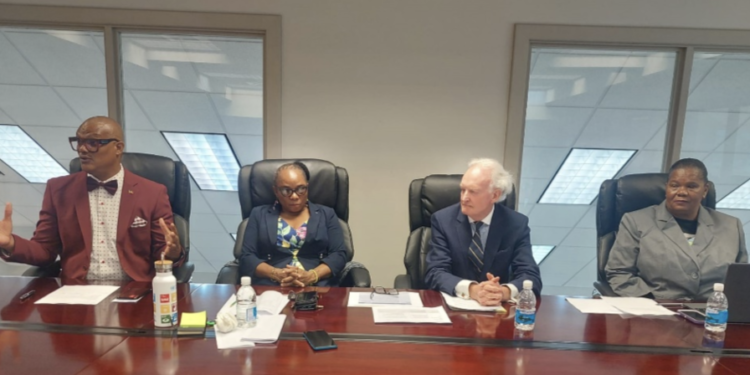The glowing prospects of continuing UNESCO’s technical expertise and financial support in the fields of Education, Biodiversity, and Cultural heritage were presented this week at sessions convened by the St. Kitts and Nevis National Commission for UNESCO and the Man and Biosphere National Committee. The sessions coincided with the visit to the Federation by the St. Kitts and Nevis Ambassador to UNESCO, Dr. David Doyle.
In the presence of the Honourable Deputy Prime Minister, and Minister responsible for UNESCO affairs, Dr. Geoffrey Hanley, committee members learned about the success of recently completed projects as well as current negotiations at UNESCO HQ aimed at securing critical expertise, and funding, in the following areas of this specialized UN agency:
* further professionalising the teaching force
* strengthening the biodiversity credentials at the St. Mary’s Biosphere Reserve
* restructuring of the National Accreditation System
* progressing towards the significant achievement of full compliance with the Anti-doping in Sport standards (currently 73.8%)
* identify and safeguard St. Kitts and Nevis Intangible Cultural items and develop a National Intangible Cultural Heritage Policy framework
* identifying eligible historical, cultural sites in the Federation for inscription on the SKN Tentative List, as a basis for selecting one site for eventual inscription on the World Heritage List.
In his brief address to committee members, Minister Hanley described all these initiatives as “critical support foundations in our transitioning to a robust sustainable island state.”
The meeting of the MAB National Committee, chaired by Telca Wallace, coordinator of the Man and Biosphere Committee was graced by the presence of Dr. Joyelle Clarke, the Minister for Sustainable Development; Lanein Blanchette, Speaker of the St. Kitts-Nevis National Assembly, and Kelvina Salters, Director of Community Empowerment, all of whom have vested interests in the success of the activities of the St. Mary’s Biosphere Reserve.
The Minister and members were reminded that St. Kitts and Nevis, through the St. Mary’s Biosphere Reserve (SMBR), was the only SIDS to be chosen to benefit from the UNESCO Earth Network Programme funded by the Italian government, aimed at converting the SMBR into a more sustainable, biodiversity-friendly tropical environment.
Interventions by a UNESCO-accredited biodiversity/ecological expert, who visited the Federation in February and August 2023, enabled the MAB National Committee to identify specific challenges and biodiversity solutions to be addressed. Future priorities, noted Telca Wallace, would consist of securing further UNESCO assistance to improve agricultural practices (tools, methods of cultivation, preservation) and focus on the monetisation of biodiversity-led sustainable agriculture processes. The aim is to embrace better use of tropical forests, enhance rainwater capture and the cultivation of new fruits, combat soil erosion, explore introducing seed varieties more tolerant to heat and drought. Minister Hanley hailed the innovative nature of continuing biodiversity developments at the St Mary’s Biosphere Reserve as “an outstanding success story”.
In parallel, plans are being elaborated with Man and Biosphere experts at UNESCO HQ, and the UNESCO Cluster Office in Jamaica, to transform the Reserve into a single-plastic-free MAB zone. This will be aligned with the St. Kitts and Nevis government’s strategy to eliminate single-use plastic in the Federation.
Implementation of the Gender Equality Policy and its integration into education and social norms was also cited for UNESCO’s imminent attention. A two-year project is envisaged for support from a UNESCO-accredited expert, who will focus on, notably, the plight of young boys who leave the formal educational system with risks of disenfranchisement.
With the support of the Government of Japan’s fund-in-trust, the Federation will pursue integrating the Education for Sustainable Development (ESD) framework into the education curriculum to develop policy and train policy makers; pilot school-level projects; train of educators; support youth-driven project-based learning; and generate local community-level actions involving diverse stakeholders.
In concluding the briefings with committee members, Deputy Prime Minister, Dr. Geoffrey Hanley praised all present for their individual and collective contributions in “making UNESCO a pivotal partner in St. Kitts and Nevis’ quest to transform the country into a sustainable island state”.
He reminded participants of his central message delivered before at the UNESCO General Conference last November in Paris. When he addressed some 100 plus ministers, he reaffirmed the importance of education in forging the future of St. Kitts and Nevis. The Minister asserted that the quest for quality education, at all levels of society, transcends the country’s economic, social and financial strategy. “Our aim, he reiterated, “is to transform our small island state economy, relying on a dedicated qualified, skilled and knowledgeable workforce”.
During the joint sessions, Ambassador Dr. David Doyle commented that, “St. Kitts and Nevis continues to benefit from UNESCO’s interventions at a particularly high-level of policy development, advice and project implementation, with an accentuated level of activity going into 2025.”
His visit to St. Kitts and Nevis afforded opportunities to meet Prime Minister, Dr. Terrance Drew as well as Dr. Denzil Douglas, Minister of Foreign Affairs, International Trade, Industry, Commerce and Consumer Affairs, Economic Development and Investment.
Secretary General to the St. Kitts and Nevis National Commission for UNESCO, Dorothy Warner, expressed appreciation to the members of both Committees, and staff, for their active participation in ensuring the success of the two pivotal events.




